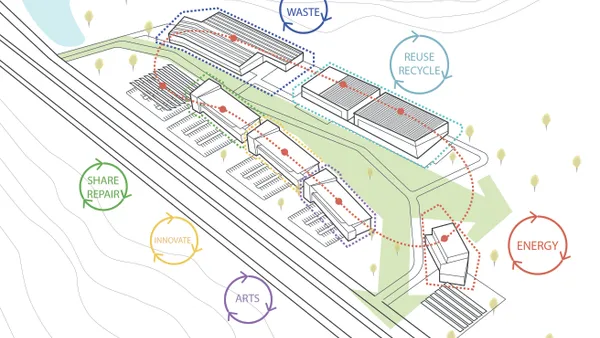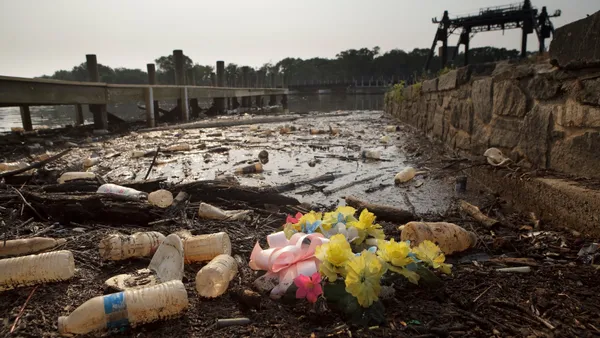Dive Brief:
- The Denver City Council recently approved a bill setting a 10-cent fee on each "disposable" plastic and paper bag customers receive from retail stores.
- The city will receive 6 cents per bag sold to be used for administrative costs and waste reduction programs. Retailers will keep 4 cents per bag for public education about the fee and providing free, reusable bags to customers. Bags including those used for produce, fresh meat or fish, dry cleaning, prescription drugs and newspapers will be exempt. Customers using federal or state food assistance programs will not have to pay the fee.
- Mayor Michael Hancock signed the measure into law on Dec. 26, 2019 and it will take effect July 1. Covered retailers include those selling "consumer goods, household items or groceries," but not restaurants.
Dive Insight:
Single-use bag fees and bans are proliferating in communities across the country. Last month, Philadelphia passed a single-use plastic bag ban, although the final measure eliminated the proposed 15-cent fee on all other disposable bags. In November, Baltimore passed a plastic bag ban and set a 5-cent fee on other bags, including paper and compostable varieties.
This month new bag bans or fees take effect in dozens of communities across the country including: Albuquerque, New Mexico; Camden, South Carolina; Pittsfield, Massachusetts; Cuyahoga County, Ohio; and numerous New Jersey cities. Multiple state laws passed in 2019 are also taking effect this year.
Denver previously tried and failed at passing this kind of legislation, like many other local governments. This time, Councilwoman Kendra Black reportedly preferred a ban but introduced fee legislation. Colorado state law prohibits local bans on items such as bags, polystyrene foam and straws.
More than a dozen states have bag ban preemption laws in place and more — including Florida, Oklahoma and Tennessee — passed or tried to pass preemption laws last year. Environmental groups often oppose such laws, while some packaging and business advocates say they help keep operating costs down and maintain regulatory consistency.
Some cities still advance single-use bag bans despite state preemption laws. Laredo, Texas enacted a bag ban in 2014 that was overturned by the state Supreme Court in 2016. Bisbee, Arizona came under fire from state legislators for its 5-cent bag fee, with the state attorney general ruling in 2017 that it violated a preemption law.
Sometimes states overlook cities violating preemption laws or local governments find ways around them, according to Alex Truelove, director of U.S. PIRG's Zero Waste Campaign. For example, Pennsylvania Gov. Tom Wolf signed a one-year bag fee and ban preemption law in 2019, and Philadelphia's new law takes effect the day after it expires.
One city's actions can also cause a ripple effect among like-minded communities and could affect state policy. If Denver ever decided to pursue a ban again, as other smaller municipalities in Colorado have, it could help create momentum for a repeal of the statewide preemption.
"If Denver – the biggest city in Colorado – does it, things might be different. Industry groups or [others] might file a lawsuit against the state" to overturn the preemption law, Truelove told Waste Dive. "There is a chance that Colorado could be the first state to repeal a preemption law."
Public attention to environmental issues, especially plastic waste, boomed in 2019. More cities are responding to the public outcry to eliminate single-use plastics. While some people suggest alternatives such as better plastic recycling programs, many activists argue that approach doesn't offer a strong enough solution.
"Our priority is to reduce as much plastic waste as possible. If the bathtub is overflowing, the first thing you do is shut off the faucet," said Truelove. "But in states like Colorado, where they're not legally able to do that, a fee is the next best thing. In Boulder, the first year of their bag fee saw an 80% reduction in bag use."
In a sign that such policies are becoming more acceptable to business groups, both the Colorado Retail Council and Colorado Wyoming Petroleum Marketers Association submitted letters indicating general support for the Denver law ahead of its passage.















